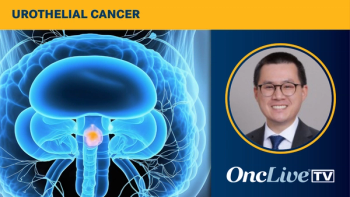
Metastatic Bladder Cancer: Progression After Maintenance
Shilpa Gupta, MD: For patients who get first-line platinum-based therapy and then get on avelumab maintenance and progress, we have several options available. Enfortumab vedotin was approved as standard of care for patients with metastatic or advanced urothelial cancer who have had a prior platinum and immunotherapy, so that would be an excellent option. Based on next-generation sequencing, if patients have FGFR3 mutations, then they can also get erdafitinib, which is an oral FGFR3 inhibitor. These options are still available for patients who progress after avelumab maintenance.
Jeanny Aragon-Ching, MD: The choice of therapy after progression of metastatic urothelial cancer in the setting of avelumab maintenance is a great question to which I don’t think we have great answers. We may recall in the setting of first-line chemotherapy, let’s say, and in the previous paradigm that we had, we wait until progression and then use checkpoint inhibitors and second-line therapy. We have certain drugs that we could go to.
If a patient does have a targetable mutation or alteration, like FGFR, then we can use erdafitinib, which is already for that setting. Another drug we can go to is enfortumab. Enfortumab is FDA approved specifically in that setting for patients who have failed prior chemotherapy, as well as immunotherapy.
In terms of the sequencing, a lot of people will go to either enfortumab or erdafitinib in patients who have had great response to chemotherapy. The patients who went on to JAVELIN Bladder 100 achieved a CR [complete response], PR [partial response], or stable disease. I will also potentially recycle. If the patients are having good performance status, and it’s been about a year since they got the first chemotherapy, that may still be an option, especially if there are no good clinical trial options available after failing all these targeted therapies and enfortumab.
Erdafitinib is a small molecule inhibitor for patients with FGFR alterations, a very promising drug, and it’s approved by the FDA specifically for these patients. I would say it applies only to a minority of patients who test positive for the FGFR alterations. That number is easily about 20% of patients with advanced urothelial carcinoma—a little higher, perhaps, in those who have upper-tract urothelial carcinomas, up to about maybe 40%. The basis of the FDA approval was a small study, an open-label phase 2 trial run by the BLC2001 study group.
They enrolled about 99 patients. Now the primary end point was objective responses, which they met, and the rate of confirmed response to erdafitinib was a striking 40%. They were almost complete responses, about 3%. Thirty-seven percent had PRs, so it is a promising and useful drug to use, especially for those, and only for those, who have FGFR alterations. This is not everyone and is the basis and rationale for testing early on for genomic sequencing in patients with metastatic bladder cancer.
Transcript Edited for Clarity




































